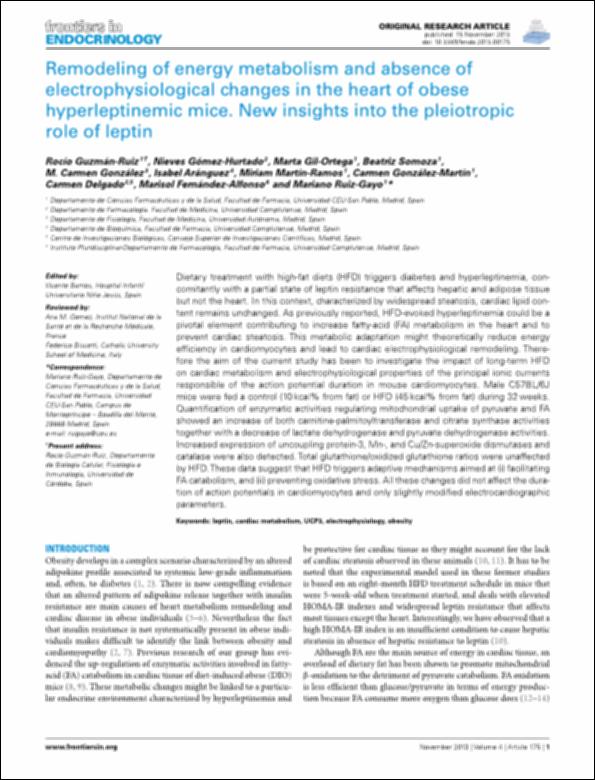Please use this identifier to cite or link to this item:
http://hdl.handle.net/10637/14616Remodeling of energy metabolism and absence of electrophysiological changes in the heart of obese hyperleptinemic mice. New insights into the pleiotropic role of leptin
| Title: | Remodeling of energy metabolism and absence of electrophysiological changes in the heart of obese hyperleptinemic mice. New insights into the pleiotropic role of leptin |
| Authors : | Guzmán Ruíz, Rocio Gómez-Hurtado, Nieves Gil Ortega, Marta Somoza Hernández, Beatriz González, María del Carmen Aránguez, Isabel Martín Ramos, Miriam González Martín, Carmen Delgado, Carmen Fernández Alfonso, María Soledad Ruíz Gayo, Mariano |
| Keywords: | Cardiac metabolism; Electrophysiology; Obesity |
| Citation: | Guzmán-Ruiz R, Gómez-Hurtado N, Gil-Ortega M, Somoza B, González MC, Aránguez I, Martín-Ramos M, González-Martín C, Delgado C, Fernández-Alfonso M, Ruiz-Gayo M. Remodeling of energy metabolism and absence of electrophysiological changes in the heart of obese hyperleptinemic mice. New insights into the pleiotropic role of leptin. Front Endocrinol (Lausanne). 2013 Nov 15;4:175. doi: 10.3389/fendo.2013.00175 |
| Abstract: | Dietary treatment with high-fat diets (HFD) triggeenrs diabetes and hyperleptinemia, con- comitantly with a partial state of leptin resistance that affects hepatic and adipose tissue but not the heart. In this context, characterized by widespread steatosis, cardiac lipid con- tent remains unchanged. As previously reported, HFD-evoked hyperleptinemia could be a pivotal element contributing to increase fatty-acid (FA) metabolism in the heart and to prevent cardiac steatosis. This metabolic adaptation might theoretically reduce energy efficiency in cardiomyocytes and lead to cardiac electrophysiological remodeling. There- fore the aim of the current study has been to investigate the impact of long-term HFD on cardiac metabolism and electrophysiological properties of the principal ionic currents responsible of the action potential duration in mouse cardiomyocytes. Male C57BL/6J mice were fed a control (10 kcal% from fat) or HFD (45 kcal% from fat) during 32 weeks. Quantification of enzymatic activities regulating mitochondrial uptake of pyruvate and FA showed an increase of both carnitine-palmitoyltransferase and citrate synthase activities together with a decrease of lactate dehydrogenase and pyruvate dehydrogenase activities. Increased expression of uncoupling protein-3, Mn-, and Cu/Zn-superoxide dismutases and catalase were also detected. Total glutathione/oxidized glutathione ratios were unaffected by HFD. These data suggest that HFD triggers adaptive mechanisms aimed at facilitating FA catabolism, and preventing oxidative stress. All these changes did not affect the dura- tion of action potentials in cardiomyocytes and only slightly modified electrocardiographic parameters. |
| URI: | http://hdl.handle.net/10637/14616 |
| Rights : | http://creativecommons.org/licenses/by-nc-nd/4.0/deed.es OpenAccess |
| ISSN: | 1664-2392 |
| Issue Date: | 15-Nov-2013 |
| Center : | Universidad San Pablo-CEU |
| Appears in Collections: | Facultad de Farmacia |
Items in DSpace are protected by copyright, with all rights reserved, unless otherwise indicated.


